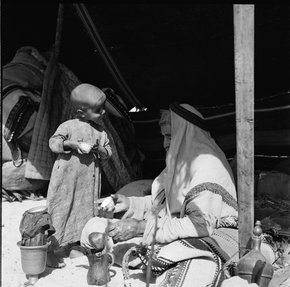Arabic coffee is traditionally served in a finjan, a small, handleless coffee cup. Fanajin (plural of finjan) were often made of porcelain and decorated with patterns inspired by the Arab environment, such as palm trees. Nowadays, fanajin come in different materials, sizes, shapes, and colours.
It is a tool used to communicate social status and group dynamics. For example, the order in which guests are served coffee and the amount of coffee in the cup can both convey important social messages.
While holding the coffee pot in his left hand and the finjan in his right, the coffee server customarily starts by serving the oldest guest seated in the centre of the majlis, then continues to the person on their right. Only a third of the cup is filled, as filling the entire cup is considered rude. It is customary to accept three cups of coffee with your right hand before returning the finjan with a slight shake of the cup to indicate that you do not want more coffee. If you do not shake your hand, the cup will be refilled and returned to you.
Traditionally, when guests have accepted coffee, they should drink three cups. The first cup is known as the "Guest's Cup" (finjan al-dhayf) – which is served as a welcome to the visitor and is understood as an implicit act of trust. The second cup is the Sword's Cup (finjan al-sayf). After the guests have drunk this cup, they are committed to defending the host's household. The third cup is the Pleasure Cup (finjan al-kayf) which is drunk by the guests to show that they have enjoyed the coffee.
Coffee hospitality was used in Arabia as a mediating custom to facilitate the settlement of conflicts. The tribal sheikh would visit as a mediator and would refuse to drink the coffee cup offered to him and his companions until the host gives a public statement that the issue that the sheikh has come to address will be solved accordingly. Only then will the sheikh take the offered coffee cup as a gesture signifying the resolution of the issue.
